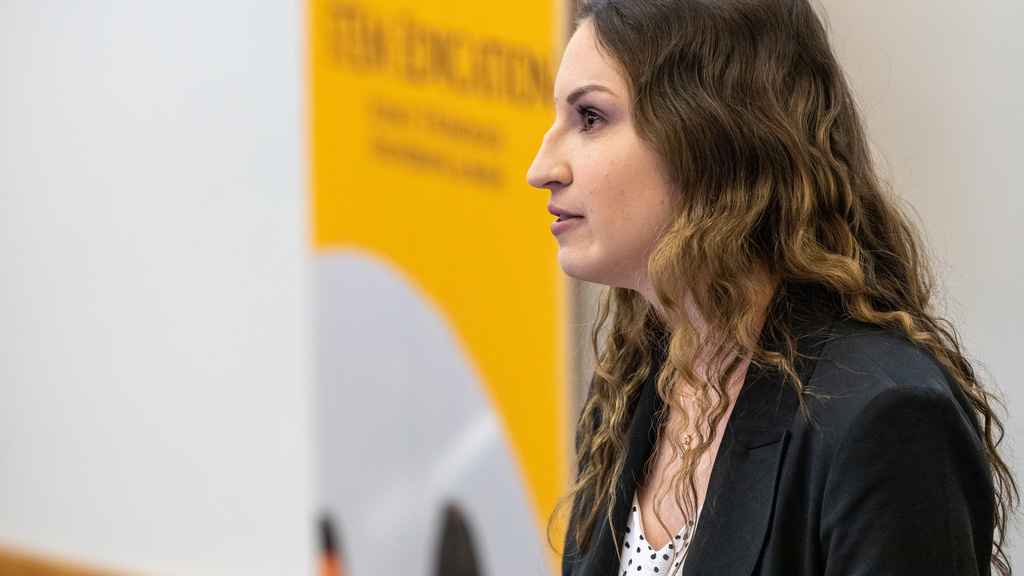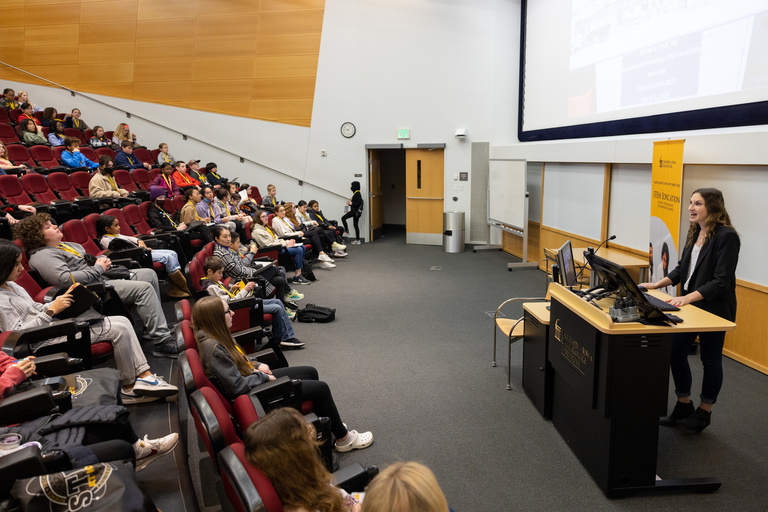
During her academic career, college professors repeatedly told Kimberly Fiock that she would not become a scientist because of stereotypes surrounding her bipolar disorder.
She was not intelligent enough to hold down a stable job. She would be difficult to work with because of her temperament.
All these misconceptions motivated Fiock to prove everyone wrong. She was admitted to the University of Iowa for graduate school in the Department of Pathology, earning master’s and doctoral degrees in Assistant Professor Marco Hefti’s lab.
“Regardless of the issues and problems she talked to me about, she had an underlying passion and interest in both doing science and communicating that passion, which is very important,” Hefti says about his first graduate student. “In science, one of the biggest determinants of success are the passion or interest you have in what you are doing. That is one thing that (scholars) cannot learn or acquire in other ways. (Fiock) is an extremely bright and highly intelligent scientist. That combined with her passion and interest had enabled her to take off.”
Fiock, who successfully defended her dissertation in experimental pathology last month, performed with distinction both in the lab and within the community throughout her graduate studies.
Academic Success
Fiock researches a protein called tau that is important for normal brain development. As individuals age, changes to tau can make it toxic to cells, which leads to the development of different neurodegenerative diseases, including Alzheimer’s.
With a tripling in the number of cases of neurodegenerative diseases caused by tau predicted over the next three decades (affecting roughly 139 million people), research focused on preventing tau from becoming toxic is more important than ever.
“In Alzheimer’s, the idea is (the protein) beta amyloid triggers problems with tau,” Fiock says. “In other diseases where you only have tau, there is no beta amyloid to trigger it. We are trying to understand what causes tau to go from a perfectly normal protein that everyone needs to a bad protein that causes cells to die.”
Another neurodegenerative disease impacted by the interaction of these proteins is frontotemporal dementia.
“You can have the memory component, but you also find a lot of behavioral challenges,” Fiock says. “Violence can happen. People who are peaceful before can become aggressive. Also, there is dysregulation of emotions, tremors, and problems with gait. But those changes can be hard for people recognize as symptoms of an underlying disease because most people are not looking for them.”
Fiock has published four first-author research papers. She also won the 2021 L.B. Sims Outstanding Master’s Thesis Award from the Graduate College. The National Institutes of Health through the Outstanding Scholars in Neuroscience Award Program commended Fiock for her exceptional work.
Community Outreach

Outside of the lab, Fiock has supported and inspired the next generation of scientists by creating interactive outreach events, introducing more than 2,000 students to neuroscience, and educating the public via her social media platform about the field of neuropathology.
Fiock began her outreach and social media efforts in 2020 during the COVID pandemic.
“I was longing for connections with people, because I did not know any other PhD students outside my lab at the time,” Fiock says. “I really wanted to connect with people in my field. I saw all these interesting Instagram accounts for women in all the STEM fields. When I looked for people doing neuropathology, there was not anyone talking about it. I decided to make my Instagram account, drawing attention to this field. It is a clinical field, but also an active area of research.”
People started finding Fiock through her Instagram account, which has 23,000 followers and has reached over 2,000,000 people, and started asking her to do speaking engagements and presentations for their organizations. She also got connected with the STEM Education Office at University of Iowa Hospitals and Clinics. In all, she lectures in neuroscience and pathology classes, presents at STEM events, provides 1-on-1 mentorship with students, and gives talks about outreach education and research (she has given 25-30 talks).
Fiock gives presentations to a wide range of age groups, including young children and teenagers.
“After the pandemic, kids are grappling with mental health issues more than they ever were before and at younger ages,” Fiock says. “I like being a role model, telling them what they are going through is difficult stuff, and it could go away if the situation gets better, or it could be a lifelong problem but that is OK. I am here to help them and show them no matter what they can achieve whatever they want.”
With her doctorate completed, Fiock has accepted a staff scientist position in the UI’s Department of Pathology. She will continue to conduct neuropathology research, specifically with donated human brain tissue. Much of her work now will be focused on helping other researchers gain access to and learn how to work with human tissue.